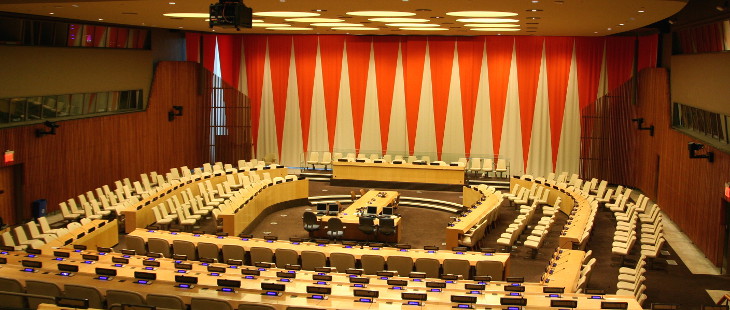Contact

James Harrison
for further information about this project.
Further Information
On 4th and 5th November 2013, co-director of the Centre and Academic Lead on Global Governance, Dr. James Harrison, spoke at the Austrian Scientific Foundation for International Developments (ÖFSE) in Vienna. His keynote presentation was on Human Rights Impact Assessment: Potential and Challenges in the Development Context and can be viewed on the ÖFSE’s website. He also delivered a second presentation titled Human Rights Impact Assessments of Free Trade Agreements: What is the State of the Art?
In 2008-09 the Centre provided support and methodological guidance to the Canadian Council for International Co-operation (CICC) and the Canadian Parliament's Standing Committee on International Trade with regard to proposals for a HRIA of the Canada-Colombia Free Trade Agreement (FTA). Dr. Harrison produced a background paper setting out the main methodological issues in undertaking an HRIA of a trade agreement. Dr. Harrison also led a number of training and capacity-building sessions for parliamentarians and civil society actors to discuss how an HRIA might properly function.
In 2011, Dr. Harrison acted as an advisor to the Canadian Department for Foreign Affairs and International Trade on the development of their methodology for their human rights reporting mechanism on the Canada-Colombia FTA. In June 2012, Dr. Harrison was asked to give evidence to the Standing Committee on International Trade (CIIT) of the House of Commons of the Parliament of Canada in relation to the first year's human rights report.
In May 2012, the Centre for Human Rights in Practice began a joint project with Mekelle University Center for Human Rights to identify the human rights and equality impacts of trade agreements in Ethiopia. The study aims to undertake a scoping study on the human rights impact of Ethiopian accession to the WTO and the Economic Partnership Agreement between African Caribbean and Pacific countries and the European Union. The report is planned to be launched in Septmber 2012. FIND PDF
The UN Special Rapporteur on Food, Professor Olivier De Schutter, convened a meeting of experts in Geneva on 23-24 June 2010 to advance methodologies and thinking for undertaking human rights impact assessments (HRIAs) for trade and investment agreements Dr. Harrison presented the main background paper at the meeting entitled "Human Rights Impact Assessments: Reflections on Practice and Principles for Future Assessments".
The report of the conference is available here.
Dr Harrison has since produced an expert paper for the UN Office of the High Commissioner for Human Rights on trade, investment and human rights to inform future impact assessment. FIND PDF
In the summer of 2010, the International Women's Development Agency (IWDA) and researchers from La Trobe Univeristy and the University of Melbourne undertook a 'scoping study' for a HRIA of the PACER-Plus trade agreement between Australia and New Zealand and the Pacific Island countries. Dr James Harrison acted as an advisor to the study.
In 2011, The Catholic Development Fund, MISEREOR, and the Heinrich Boell Foundation undertook a right to food impact assessment of the proposed EU-India Free Trade Agreement. Dr. James Harrison acted as an advsor to the study.
In July 2012, Centre Co-director, James Harrison, produced a paper which considers the value of the 'human rights due diligence' process advocated by UN Special Representative, John Ruggie. A revised version will be published in the Journal 'Impact Assessment and Project Appraisal' next year. FIND PDF In January 2011, the Centre responded to an online consultation by Ruggie. The response particularly focused on the issue of HRIAs by businesses.
On 8 and 9 December 2010, Dr James Harrison gave talks at conferences in Utrecht and Amsterdam organised by Aim for Human Rights. He presented his research on methodologies for conducting human rights impact assessments of trade agreements. The eight essential elements of the HRIA process set out in the paper were then utilised as the basis for discussion among women's human rights activists from all over the world to critique their own HRIA practice.
On 3 October, Dr James Harrison addressed health practitioners from Scotland about how to use human rights to analyse helath practices and policies, as part of a day on 'human rights and health'. Practitioners then engaged in case studies of how to undertake combined human rights and equality impact assessment. Materials and recordings of all the presentations can be found here.
Addressing the Compliance Gap? UN Initiatives to Benchmark the Human Rights Performance of States and Corporations
For the purposes of a recent article, research was undertaken in realtion to benchmarking activity by states and corporations in order to comply with human rights norms within the UN system. The tables below relate to this research. The article will be published shortly in Review of International Studies.
This table illustrates how states are utilising indicators and benchmarks with regard to the International Covenant on Economic Social and Cultural Rights. We utilised data from The Committee on Economic Social and Cultural Rights (ICESCR) on State reporting to the Convention. In this table, we illustrate how African countries have complied with their reporting obligations to this treaty using four key rights: social security, work education and health.
Our research also looked into a number of other variables including the use of structural, process and outcome indicators, civil society inclusion within the reporting process, requests for information by CESCR. Our data are downloadable as a spreadsheet.
This table illustrates engagement by multinational corporations with international human rights norms with a specific focus on the UN Guiding Principles on Human Rights and the human rights due diligence process which forms part of those principles. We undertook a review of the policies of 225 leading multinational corporations for this article. Companies were chosen on the basis of their size and their likelihood to be encountering human rights issues including the 20 largest companies ranked in the Forbes 200 List in the fields of apparel, technology, and food and beverage, mining, oil and gas and finance.


